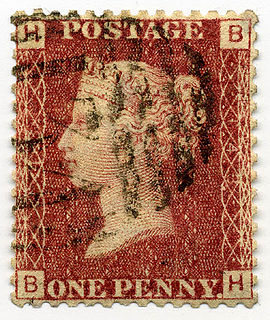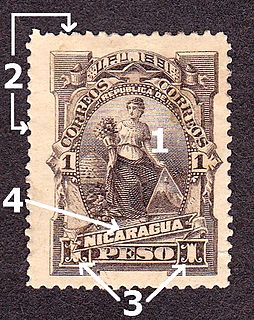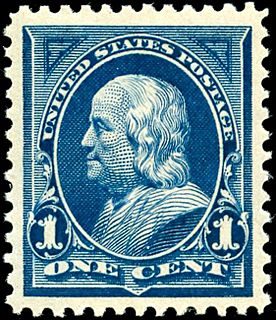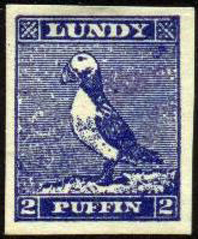
Philately is the study of postage stamps and postal history. It also refers to the collection, appreciation and research activities on stamps and other philatelic products. Philately involves more than just stamp collecting or the study of postage; it is possible to be a philatelist without owning any stamps. For instance, the stamps being studied may be very rare or reside only in museums.

A postage stamp is a small piece of paper issued by a post office, postal administration, or other authorized vendors to customers who pay postage, who then affix the stamp to the face or address-side of any item of mail—an envelope or other postal cover —that they wish to send. The item is then processed by the postal system, where a postmark or cancellation mark—in modern usage indicating date and point of origin of mailing—is applied to the stamp and its left and right sides to prevent its reuse. The item is then delivered to its addressee.

Stamp collecting is the collecting of postage stamps and related objects. It is related to philately, which is the study of stamps. It has been one of the world's most popular hobbies since the late nineteenth century with the rapid growth of the postal service, as a never-ending stream of new stamps was produced by countries that sought to advertise their distinctiveness through their stamps.

The history of postal service of the United States began with the delivery of stampless letters, whose cost was borne by the receiving person, later also encompassed pre-paid letters carried by private mail carriers and provisional post offices, and culminated in a system of universal prepayment that required all letters to bear nationally issued adhesive postage stamps.

Postage due is the term used for mail sent with insufficient postage. A postage due stamp is a stamp added to an underpaid piece of mail to indicate the extra postage due.

A revenue stamp, tax stamp, duty stamp or fiscal stamp is a (usually) adhesive label used to collect taxes or fees on documents, tobacco, alcoholic drinks, drugs and medicines, playing cards, hunting licenses, firearm registration, and many other things. Typically businesses purchase the stamps from the government, and attach them to taxed items as part of putting the items on sale, or in the case of documents, as part of filling out the form.
The postal history of Northern Epirus, a region in the western Balkans, in southern modern Albania, comprises two periods; 1912–1916 and 1940-41. Northern Epirus was under Greek administration during the First Balkan War (1912–1913), but it was then awarded to the newly founded Albanian state by the Florence Protocol (1913). During this period, Greek stamps were used. Greece withdrew from the region in early 1914. The people of Epirus were unwilling to be part of Albania, though, and launched a revolution. Under a provisional government, the independent Northern Epirus was formed in February 1914 and it eventually managed to gain full autonomy under nominal Albanian sovereignty, according to the Protocol of Corfu. Northern Epirus operated its own postal service and issued postage stamps, both official and unofficial, during that year.
Each "article" in this category is in fact a collection of entries about several stamp issuers, presented in alphabetical order. The entries themselves are formulated on the micro model and so provide summary information about all known issuers.
Each "article" in this category is a collection of entries about many stamp issuers, presented in alphabetical order. The entries are formulated on the micro model and so provide summary information about all known issuers.

The Inverted Head Four Annas of India is a postage stamp prized by collectors. The 1854 first issues of India included a Four Annas value in red and blue. It was one of the world's first multicolored stamps; the Basel Dove preceded it by nine years. However, an invert error occurred during production, showing the head "upside down."

The Overrun Countries series was a series of thirteen commemorative postage stamps, each of five-cent denomination, issued by the United States over a fifteen-month period in 1943 and 1944 as a tribute to thirteen nations overrun, occupied, and/or annexed by the Axis Powers during or shortly before World War II.

Posta Shqiptare is the national postal service of Albania. Posta Shqiptare sh.a. is a public limited company owned by the Albanian Government. As of 2017 its CEO was Laert Duraj.

Postage stamps from Albania are marked Shqiperia, Shqiperise and Shqiptare.
This is a survey of the postage stamps and postal history of North Macedonia.

Qemal Butka was an Albanian architect, painter, politician, and postage stamps engraver. He was mayor of Tirana from 1935-1936 but departed from Albania in 1939 to live in Turkey and later the United States. He is also known for projecting several monuments and buildings in Albania.

The British Library Philatelic Collections is the national philatelic collection of the United Kingdom with over 8 million items from around the world. It was established in 1891 as part of the British Museum Library, later to become the British Library, with the collection of Thomas Tapling. In addition to bequests and continuing donations, the library received consistent deposits by the Crown Agency and has become a primary research collection for British Empire and international history. The collections contain a wide range of artefacts in addition to postage stamps, from newspaper stamps to a press used to print the first British postage stamps.

The Chinchen Collection is a collection of stamps, proofs, artwork and covers from Lundy Island donated by Barry Chinchen to the British Library Philatelic Collections in 1977 and is located at the British Library.

The Mosely Collection of British Africa stamps dating to 1935 was formed by Dr Edward Mosely of Johannesburg, South Africa. The collection was donated to the British Museum by his daughter, Kathleen Cunningham, in 1946 and is now held as part of the British Library Philatelic Collections. After the Tapling Collection, this is considered the Library's most important philatelic acquisition due to the number of countries represented and the number of unique items included.
The Board of Inland Revenue Stamping Department Archive in the British Library contains artefacts from 1710 onwards, and has come into existence through amendments in United Kingdom legislation.
The Harrison & Sons Collection is a collection of postage stamps of Egypt and Palestine that forms part of the British Library Philatelic Collections. The collection is mainly of the Egypt 1921-22 issue and the Palestine 1927-45 issue and was donated by De La Rue plc in 2002.














